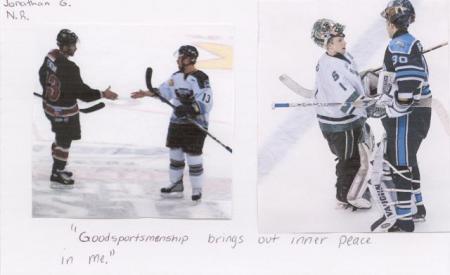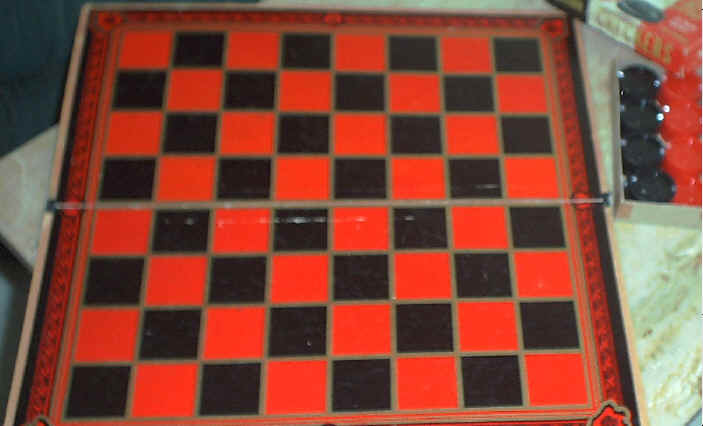My brother plays hockey and I have witnessed similar taunting by parents and other coaches - particularly on the high school level - but really all along. Many teams like ours makes parents sign a commitment like this one to appropriate sportsmanship or the player can be the one who loses their right to play. One game, my step-dad was manning the door and a mother from the opposing team came up to him screaming in his face (pretty nervy since he's 6'4" and not a small guy) about the calls and lack thereof being made by the referees. I'm not sure if she thought he worked there or what.
In another game that was part of a tournament, I witnessed parents being particularly obnoxious and taunting the players themselves - a bunch of high school kids being watched by their high school friends and younger siblings. A couple of the parents started name-calling the kids and screaming demeaning comments. Up to that point the game had been hard fought on both sides but relatively fair and both sides had equal penalties. As each period came to an end, the players grew angrier and angrier with the harassment coming from the crowd. A couple of the kids upon heading to the locker room shouted back at the parents in frustration.
During one point when both teams had players in the penalty box for fighting, I witnessed a mother with a camera taking up-close shots of her son in the penalty box and she gave him a thumbs up and made punching motions like she was encouraging the fighting. It was absolutely disgusting to me. I had my own children with me at the time and while they usually enjoy the games and cheer, my son was glued to my side eyeballing the parents on the other side of the stands as they screamed negativity at our players and my daughter, also glued to my side, pointed out that that was bullying and asked why a mom would do that to a kid. I had to tell her that it was disgusting and not right and that I don't understand why a mom would do that to a kid.
 |
| Signs like these have been popping up at kids sports all over the place. Sad to say the rules have to be directed toward the adults. |
In the end, our team won the game and the tournament. The screamers were bouncing off the walls mad and continued screaming as the kids lined up to shake hands and hand out the trophies. A few parents tried to calm the screamers down with no affect. One mom came to sit on our side of the benches. The opposing coach was asked to come forward and accept the runner-up tournament trophy. After looking at the crowd of screamers, he rudely refused and his team captain stepped up to accept the trophy. The screamers cheered at the coach's refusal.
They continued to stay and scream all the way through the presentation and pictures of our team with the tournament trophy. They totally succeeded in stealing all joy and celebration from our boys. The boys could hardly contain their anger but at least they tried - which is more than I can say for the supposed "adults" in the crowd. I don't know what they hoped to accomplish in this - they didn't accomplish anything except destruction of the joy and pride these guys had worked so hard to even be in the final game of the tournament.
In sports, as in life, we need to teach where to look for the positive, the small gains, the little victories, the milestones and achievements. If we focus on the win as the only reason to be there then we might as well not play. I know so many kids who give up on sports as much as they enjoy the sport itself because the way the parents and coaches place emphasis on the win and perfection makes the child feel like they shouldn't even play if they can't meet perfection. There are very few kids that make it to professional or Olympic status in sports but that shouldn't mean they can't play and enjoy the game.
I know you all have loved the stories about my great-grandpa and you might think I would be talking about him when I would talk about sportsmanship. But honestly, my great-grandma was the one who gave the best lessons in sportsmanship and respect for those playing the game with you no matter what your skill level was or what their skill level was. While Great-Grandma was a very active and athletic woman in her younger days, by the time I was around she had gone through hip and knee replacements and was no longer able to join us in the physical games. But she was a brilliant lady and she loved to challenge people's minds. One of our favorite activities when we would go to their house was to play board games with Great-Grandma. The usual suspects - Checkers, Chinese Checkers, and Uno.
She was a master and we were her students. But once she had explained the rules and knew that you understood them, it was up to you to go for the win yourself. You see, she never let anybody win. Some might think it was her competitive side but I think she had a strategy. She was teaching. Because if you always let the kids win, you actually rob them of several gifts that are much less painful to learn when you are little than they are to learn when you are a young adult.
We learned that if we wanted to win we had to do the work. If we got overconfident and started to hurry our game and missed a move, she might ask you once "Are you sure that's the move you want to make?". At first we'd would be like "Oh yeah because I'm going to jump your guy!". That's when she would jump 3 of your guys back in one move. Then if you asked, she would go back and show you that the move you made is what gave her that opening and if you had looked more carefully at the options then you would have been able to jump 3 of her guys and win the game. She was teaching us to weigh our options and keep an eye on what the other guy is doing too. She was also teaching us the down side to being overly confident and cocky when you think you are ahead.
Sometimes we would get down to it where we would have a whole bunch of guys surrounding her one king that was left. And that's where she would find a move to clear the board and win. She was teaching us not to count the win until the game is over. It was also a lesson in respect. She respected us as players enough to let us learn and make our own mistakes. Sometimes we were heartbroken and cried and were sore losers. She would allow us a small amount of time and then she would say "so what do you think you could have done to change the outcome?". And then she would show us a few little tricks to try the next time. So we would go home and practice against each other and greet her the next time eager to play and show her our new skills.
Eventually, we all had our wins too. And then we could own that win because we knew she didn't let us have it - we earned it. If we were too prideful in our win, she would challenge us to another round. We would almost always take it on the chin then. A lesson in gloating and being classy in a win or a loss.
All of those components are necessary when teaching sportsmanship. Sportsmanship isn't just about sports. Its about the way we deal with the challenges in life. The highs and lows - the successes and disappointments. Its how you relate to others around you - your teammates, the opposing team, coworkers, family, employees...
Its not the winning that is important - its enjoying the experience. Because when they started out, all they really wanted was as simple as this...










2 comments:
Looks like I definitely have some things to look forward to in my future! I'm so glad you linked up to the Mommy-Brain Mixer, friend! I hope to see you again next week! :)
Love the Dennis the Menace cartoon, which cracked me up.
I even pinned to this page here: Great Sports
Post a Comment